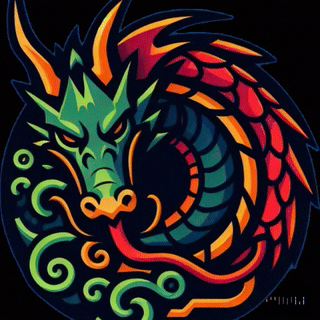Now we’re stepping into the glow of moonlight and ink-stained papyrus. Time to meet the scribe of the gods, the master of words, wisdom, and time itself—Thoth.
Chapter 8: Thoth – The God of Wisdom and the Moon
Alright, take a breath and clear your mind. Picture a silent temple at night. The stars shimmer above, the moon casts a soft silver light over ancient stone walls. Somewhere, the gentle scratch of a reed brush on papyrus echoes in the stillness. That sound? That’s Thoth, doing what he does best—thinking, writing, and shaping the very foundation of the cosmos with language.
If Egyptian mythology had a brain, Thoth would be it. He’s the god of wisdom, writing, magic, science, time, the moon, and pretty much anything involving thinking, planning, or figuring things out. Total nerd god energy—but like, the cool kind. The ancient Egyptians didn’t just see him as smart—they saw him as essential.
Bird Head, Big Brain
Thoth (sometimes called Djehuty, if you’re feeling fancy) is usually depicted as a man with the head of an ibis—that long, curved beak bird often seen wading in the Nile’s shallows. Sometimes, he’s shown as a full-on baboon, another creature sacred to him. Both animals were associated with the moon, knowledge, and sharp perception. Kind of like his own divine mascots.
And that crescent moon? That was Thoth’s domain. While Ra ruled the sun, Thoth was the guardian of night light—the moon that watched over sleeping cities and dreamers deep in thought.
Keeper of the Divine Library
Thoth wasn’t just a god who read books—he wrote them. All of them. Literally.
He was believed to have created writing itself—the system of hieroglyphs, sacred scripts, and magical incantations that priests and scribes used to connect with the gods. Every temple, every scroll, every tomb carving? That was Thoth’s influence at work.
And more than that, Thoth kept the records of the gods. He was the universe’s official historian, the keeper of truth. Everything that happened—divine arguments, mortal actions, magical contracts—he wrote it all down. Nothing escaped his quill.
When the gods couldn’t settle a dispute? They called Thoth. When someone needed help crafting a perfect spell? Thoth. When time itself had to be measured and kept in check? Guess who came through?
Yep. Thoth.
The Moon and Time Itself
Here’s something kinda beautiful—Thoth didn’t just watch the moon. He kept time by it.
The Egyptians used lunar cycles for their calendars, and Thoth was the guy behind the curtain making sure it all ran smoothly. He was the ultimate cosmic timekeeper.
There’s even a story where Nut, the sky goddess, was cursed so she couldn’t give birth on any day of the year. Harsh, right? But Thoth, always the clever one, found a loophole. He gambled with the moon (yes, the moon!) and won enough extra light to create five new days—bonus days that didn’t belong to any month. Those days became the birthdays of the major gods: Osiris, Isis, Set, Nephthys, and Horus the Elder.
That’s some high-stakes divine chess right there.
Thoth and Ma’at: Partners in Balance
Thoth was closely tied to Ma’at, the goddess of truth and balance. They worked side by side in the Hall of Judgment, where souls were weighed after death.
Remember back in Osiris’s chapter, when your heart is put on the scale against Ma’at’s feather? Thoth is right there, recording the outcome. No drama, no bias—just cold, cosmic accuracy.
If the scale balanced, he’d note it. If it didn’t, he’d write that too. He didn’t sway the judgment, but he made sure everything was recorded exactly as it happened.
That kind of honesty? It was sacred. And it made Thoth not just the god of knowledge, but of justice, fairness, and eternal truth.
The Magic Master
Let’s not forget—Thoth wasn’t all business. He was also a sorcerer supreme.
In many stories, he’s the one who teaches Isis how to use powerful spells. He heals gods, stops time, and even brings people back from the brink of death using his knowledge of the spoken word.
There’s even a legend about a mysterious book—The Book of Thoth—that holds secrets to control the heavens, speak with animals, and unlock the doors of the underworld. But it’s not for the faint of heart. Mortals who seek it often pay a heavy price. Because knowledge? It’s powerful, but it comes with consequences.
Thoth reminds us that words are magic—they can shape reality, bend fate, and even bind gods. And if you understand the right ones, you can change the world.
The Chill Divine Vibe
What makes Thoth so unique is how balanced he is. He’s not a fighter, but he’s strong. He’s not flashy, but he’s vital. He doesn’t need a spotlight—he is the spotlight.
In a pantheon full of gods fueled by passion, war, lust, and drama, Thoth is the cool, calm, collected force who brings clarity. He’s the one holding the blueprint while everyone else is winging it. The scribe who watches, listens, and speaks only when it truly matters.
You know those people who don’t say much, but when they do, everyone shuts up and listens? That’s Thoth.
So, if you’ve ever scribbled your thoughts in a journal, stayed up all night pondering the stars, or found the perfect phrase that speaks truth like nothing else—chances are, Thoth was nearby, smiling in that wise, ibis-headed way of his.
Next up: Part 9: Bastet and Sekhmet – Dual Faces of the Divine Feminine, where we explore how one goddess can be your purring protector and your roaring destroyer, depending on the day. You ready? Let’s meet the lioness and the cat. 🐱🦁
480-366-3550 (Domain Sales)
© SDBEST LLC, 2025. All rights reserved.
Sponsorship Disclosure
Terms of Service
